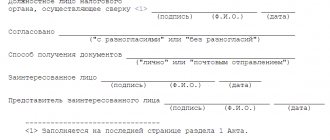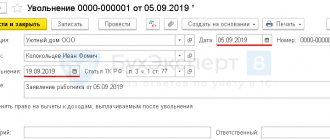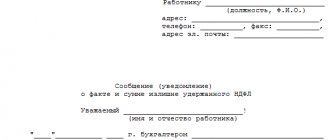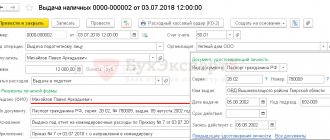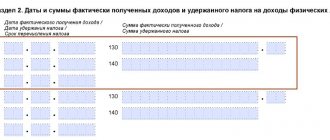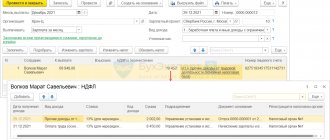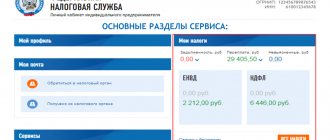First, let's talk about such a fairly popular case as recalculating wages after dismissal. Recalculations of employees' salaries after dismissal occur frequently, and for an accountant this is always associated with a whole range of problems: postings, adjustments for insurance premiums and personal income tax, “clarifications”, etc. All this happens both in the case of overpayment and underpayment of wages allowed before the employee was dismissed.
Most often, overpayment of wages is caused by overexpenditure of vacation or unearned advances.
In the first case, the employee was granted leave for the unworked period. At the time of dismissal, the period for which vacation pay was paid remained unworked, and vacation pay became an excessively issued salary.
The second case is when an employee received money in the middle of the month, after which he quit, and the actual accrued salary for a given month turned out to be less than the advance received.
There are three ways to get out of the situation with overpayment of wages.
We ask the employee to voluntarily repay the debt
If the advance payment is returned, there will be no need to make adjustments to insurance premiums, since insurance premiums are not charged from the advance amounts. The same applies to personal income tax, if the employer does not withhold tax from advances paid.
If it is withheld, then the transferred tax will have to be returned to the current account or counted against future payments to the budget, and an updated 2-NDFL certificate will be issued for the employee if the tax period in which the overpayment occurred has expired.
If you voluntarily return the overpayment, there is no need to make any mutual settlements with the personal income tax officer, since he returns the money from which personal income tax has already been withheld, that is, minus tax.
When returning vacation pay, the accountant must reverse the accrual entry and cancel expenses in the form of accrued vacation pay in tax accounting.
There is an overpayment of insurance premiums. For the current period, it is necessary to take into account the adjustments for their accrual, and the overpayment should be adjusted with further payments.
If, in connection with the deletion of accrual of vacation pay, negative values are formed in the personalized accounting in the Pension Fund of the Russian Federation for an employee, the company’s report will not be accepted. Therefore, you will have to adjust not the current period, but the previous period. An overpayment of personal income tax is formed, withheld from the amount of vacation pay and transferred to the budget.
If the 2-NDFL certificate for the corresponding year has been submitted, you need to make an updated certificate - the current date with the old number.
The posting for accrual of personal income tax on vacation pay is reversed. The resulting tax overpayment can be returned to your current account or offset against future payments to the budget. EXAMPLE 1. HOW TO REFLECT OVEREXPENDITURE OF HOLIDAY PAY AND THEIR VOLUNTARY REFUND
At the beginning of the reporting year, employee Belov was granted early leave for the unworked period.
The amount of accrued vacation pay is 20,000 rubles, personal income tax in the amount of 2,600 rubles. (RUB 10,000 × 13%) was withheld and transferred to the budget. Belov received 17,400 rubles. (20,000 rubles - 2600 rubles). The accountant made the following entries: Debit 20 Credit 70
- 20,000 rubles.
– vacation pay was accrued to Belov; Debit 70 Credit 68
- 2600 rub.
– personal income tax accrued; Debit 68 Credit 51
- 2600 rub.
– personal income tax is transferred; Debit 70 Credit 50
- 7,400 rub.
- vacation pay was issued to Belov. Returning from vacation, Belov resigned. The vacation pay was returned to the cash register. The accountant made the following entries: Debit 20 Credit 70
- 20,000 rubles.
– Belov’s vacation pay was reversed; Debit 70 Credit 68
- 2600 rub.
– personal income tax accrual was reversed; Debit 50 Credit 70
- 17,400 rub. - Belov returned overpaid vacation pay. In tax accounting, wage expenses in the amount of 20,000 rubles. cancelled. Overpayment of personal income tax in the amount of 2600 rubles. will be counted against upcoming payments to the budget after the tax inspectorate makes an appropriate decision based on an application from the tax agent.
We file a lawsuit in case of refusal
If the issue of returning overpaid amounts is resolved through the court, these amounts (without personal income tax) must be transferred from account 70 to account 73. If the outcome is successful for the employer and the former employee returns the money, the amount should be written off in correspondence with accounts 50 or 51. If the employee wins, the amount will need to be returned from account 73 to account 70.
If the employee wins, expenses in the form of vacation pay must be reflected in account 91, and these expenses must be canceled in tax accounting. If the employer wins, the expenses should be canceled in both accounting and tax accounting.
As for insurance premiums, they will be considered legally paid if the former employee wins and the overpaid amount is not returned. No accounting adjustments will be required.
If the former employer wins and the debt is repaid, the contributions will be an overpayment and will need to be reflected in the current statements as a debt of the fund.
As for personal income tax, if the company wins, the accounting decision is similar to the case of the voluntary return of money by the employee.
If the employee wins, the tax is considered to have been withheld and paid legally and no adjustments are necessary. EXAMPLE 2. HOW TO REFLECT OVEREXPENDITURE OF HOLIDAY PAY AND THEIR REFUND BY COURT
At the beginning of the reporting year, employee Belov was granted early leave for the unworked period.
The amount of accrued vacation pay is 20,000 rubles, personal income tax in the amount of 2,600 rubles. (RUB 10,000 × 13%) was withheld and transferred to the budget. Belov received 17,400 rubles. (20,000 rubles - 2300 rubles). The accountant made the following entries: Debit 20 Credit 70
- 20,000 rubles.
– vacation pay was accrued to Belov; Debit 70 Credit 68
- 2600 rub.
– personal income tax accrued; Debit 68 Credit 51
- 2600 rub.
– personal income tax is transferred; Debit 70 Credit 50
- 17,400 rub.
– vacation pay was paid to Belov. Returning from vacation, Belov resigned. He refused to return vacation pay. The company filed a lawsuit. The accountant made the posting: Debit 73 Credit 70
- 17,400 rubles.
(RUB 20,000 – RUB 2,600) – a claim for overpaid vacation pay is reflected. Option 1
Belov won the court. The accountant made the following entries:
Debit 70 Credit 73
- 17,400 rubles.
– the claim is rejected; Debit 20 Credit 70
- 20,000 rub.
– Belov’s vacation pay was reversed; Debit 91 Credit 70
- 20,000 rub.
– Belov’s vacation pay was written off as other expenses. In tax accounting, the amount of 20,000 rubles was excluded from expenses. Option 2
The company won the court. The accountant made the following entries:
Debit 50 Credit 73
- 17,400 rubles.
– vacation pay was returned by Belov by court decision; Debit 20 Credit 70
- 20,000 rub.
– Belov’s vacation pay was reversed; Debit 68 Credit 70
- 2600 rub. – personal income tax accrual was reversed. In tax accounting, the amount of 20,000 rubles was excluded from expenses.
How to correct the error if the employee has already left the organization
As long as the employee works for the company, the issue of overpaid amounts is much easier to resolve. But it also happens that a mistake was made literally before the employee was fired, and was discovered only when he no longer works in the organization.
In this case, it should be borne in mind that all deductions, if the employee has given his consent, are made exclusively from earnings. In this regard, it is not possible to retain surplus from a resigned employee. The former employee may decide to voluntarily return the funds, or they will have to be demanded through the court. In court, you will have to prove the fact of a counting error or malicious intent of the employee . To go to court, you will need to write an application and attach to it an employment contract with a former employee, salary settlement documents, an error report, and a notice requesting the return of the overpayment that was sent to the employee.
We forgive the debt
This is the simplest way out - forgiving is always easy and pleasant. Although it is expensive, it will be rewarded. If the debt arose due to an unpaid advance, the debit balance on account 70 will remain until written off. If the debt arose due to overspending on vacation, you need to reverse the accrual of vacation pay and exclude the amount from tax expenses. The debit balance on account 70 will also remain “hanging” until it is written off.
Insurance premiums from the amount of vacation pay are legally paid. No adjustments in accounting and reporting are needed. Personal income tax is withheld from the amount of vacation pay and transferred to the budget on a reasonable basis. Therefore, there is no need to re-calculate and withhold personal income tax when forgiving debts for unworked vacation days (letter of the Federal Tax Service of Russia for Moscow dated June 28, 2018 No. 20-15/138129). No need to make any adjustments.
If the company did not withhold personal income tax from the unpaid advance, after writing off the debt, you need to inform the tax office about the impossibility of withholding tax by providing a certificate in form 2-NDFL with sign “2”.
Note! The debt must be written off after the expiration of the three-year limitation period (Article 196 of the Civil Code of the Russian Federation). When writing off, the accountant must make the following entry:
DEBIT 91 CREDIT 70
— the debt is written off due to the expiration of the statute of limitations.
Working on errors - counting
As you know, there is never too much salary... The employee was paid less than he would like in his secret dreams, but more than he was entitled to in reality. One of the grounds that makes it possible to recover excess payments from an employee is a counting error (Article 137 of the Labor Code of the Russian Federation). But you will need to justify your position in the event of a dispute.
Rostrud and the courts have repeatedly pointed out that a counting error should be understood as incorrect arithmetic calculations (letter of Rostrud dated October 1, 2012 No. 1286-6-1, Determination of the Supreme Court of the Russian Federation dated January 20, 2012 No. 59-B11-17). For example, when an accountant mistakenly uses multiplication or subtraction instead of addition. If, due to such an error, the employee voluntarily refuses to return the overpayment, recover it through the court.
Incorrect math operations
An accountant's explanatory note with mathematical formulas and a step-by-step calculation algorithm will help you prove a counting error in court.
It should be clear from the explanations what arithmetic operations led to the overpayment. Confirm in court that the accountant not only incorrectly calculated the payment, but also actually transferred it. Pay slips, statements, and payment orders will help with this. EXAMPLE 3. ADDITION ERROR
In a company, the average salary to pay for study leave was temporarily calculated manually. The accountant had to calculate several amounts to pay an employee vacation pay. The employer presented calculations from which it follows that individually she calculated everything correctly. But when I added up the components of the payments, I made an error in the arithmetic calculations. Therefore, the employee was significantly overpaid. The court considered this a counting error and ordered the employee to return the extra money (appeal ruling of the Moscow City Court dated April 8, 2016 No. 33-7119/2016).
Program crash
It happens that it is not the accountant himself who makes the mistake in calculating payments, but the program that the company uses. In this case, the courts do not have a common position on whether to consider such an overpayment an accounting error or not. It is important to convince the court of two points. First, the extra payment occurred as a result of incorrect mathematical actions made by the program (appeal ruling of the Sverdlovsk Regional Court dated August 14, 2014 No. 33-10640/2014). Secondly, the accountant did not allow the rules to be applied incorrectly when entering data into the computer. For example, he used the current coefficient or applied calculation formulas that comply with the requirements of regulations.
Some courts recognize the error as a result of a software glitch in the counting system.
This happens if the employer was able to prove that the program was not working correctly. To do this, provide the court with a report or conclusion from the IT service that will confirm problems in the operation of the program. An accountant's act or explanatory note in this case is not enough (appeal ruling of the Supreme Court of the Chuvash Republic dated January 19, 2015 No. 33-99/2015). It is necessary to show from the technical side how the incorrect operation of the program led to the error. Such a report can be provided either by an internal specialist of the company or by someone invited from outside. EXAMPLE 4. DEDUCTION ERROR
When dismissing an employee, the employer mistakenly paid compensation for unused vacation in a larger amount. The employee refused to voluntarily return the excess amount. In court, he referred to the fact that the accountant did not attach calculations to the letter with a proposal to return the overpayment. The employer presented to the court a report on the discovery of an accounting error, which was drawn up by the accounting staff, signed by the chief accountant. The report indicated that the employee was overpaid as a result of a software failure. The error was that the program did not deduct personal income tax from the employee’s total accrued income upon dismissal. The court agreed that this error could be qualified as an accounting error, so the employee was ordered to return the overpayment (appeal ruling of the Supreme Court of the Republic of Karelia dated March 25, 2016 No. 33-1060/2016).
Not all courts recognize a software glitch as a counting error.
There is also the opposite practice. The courts indicate that this is a technical error that is not related to arithmetic calculations. Therefore, the employer has no right to withhold overpayment from the employee. EXAMPLE 5. THE COMPUTER WAS NOT FORGIVEN
During an inspection, the FSS discovered that the employer had overpaid an employee's child care allowance under the age of one and a half years. The employee refused to return the money voluntarily. Therefore, the employer filed a lawsuit. However, the court sided with the employee and stated the following. The accountant made an error in the amount of the allowance not because of arithmetic operations, but because of a malfunction in the computer program. Therefore, I considered such an error to be technical and not counting (appeal ruling of the Sverdlovsk Regional Court dated April 21, 2016 in case No. 33-7642/2016).
If the program correctly calculated the amounts, but the employee received an overpayment, you can recover it under one condition. You will have to prove that first the accountant made a mistake in the preliminary calculations, and only then entered the incorrect amounts into the computer. In court, the employer will be helped by an accountant's explanatory report with detailed calculations, as well as testimony of witnesses (appeal ruling of the Lipetsk Regional Court dated November 30, 2015 No. 33-3443/2015).
Repeated transfer
Courts give different assessments of the situation when an employer mistakenly transfers payments to an employee twice.
There are solutions in which employees are required to return extra money.
The reason given is that the employer made a counting error. However, the courts in their decisions do not explain why they came to this conclusion. One circumstance is cited as an argument in favor of the employer: “due to the fact that the employee is fired, the employer has no reason to transfer his wages or other payments.” EXAMPLE 6. DOUBLE TWO
The employer transferred maternity benefits to the employee twice. She refused to return it voluntarily. The company went to court to recognize the overpayment as an accounting error and recover it from the employee. The third party in the case was the FSS. The representative of the department and the employee herself indicated that there was no reason to return the overpayment, since the employer’s accountant made a mistake. Therefore, there is no reason to consider the error to be countable. However, the court did not agree with these arguments. The employee was ordered to return the overpayment (appeal ruling of the Tyumen Regional Court dated February 25, 2015 in case No. 33-1279/2015). Other courts recognize the employer’s guilt in the overpayment. Therefore, they believe that the employee should not return the money. The courts believe that if there are no guilty or dishonest actions in the employee’s actions, then there is no reason to consider the error to be counting (appeal ruling of the Kurgan Regional Court dated May 12, 2016 in case No. 33-1593/2016). In practice, there are cases in which the courts consider double transfer of money as unjust enrichment. The norms of civil law are applied to such cases (Article 1102 of the Civil Code of the Russian Federation). The overpayment is recognized as illegal enrichment. On this basis, the employee is obligated to return the funds to the employer (appeal ruling of the Moscow City Court dated August 12, 2016 in case No. 33-27074).
In what cases can an error occur due to the fault of an accountant?
Errors caused by an accountant occur in different situations. An employee, willingly or unwillingly, may distort data or make calculations with an error. No one is immune from this. The most common mistakes made by accountants are:
- Sometimes even the most well-established program fails. At best, the data may be distorted, at worst, it may disappear completely. In such a situation, it seems that the accountant is not particularly to blame, but a thorough check after such an incident is definitely necessary. If you treat the situation negligently, an error may creep into your accounting.
- There is a possibility of incorrect accounting of the scope of work. If the data is incorrect or inflated, this will lead to an overpayment in favor of the employee
- Inattention to personal income tax deductions leads to an incorrect amount of accrued tax, and, accordingly, to an underestimation or overestimation of the amount of income payable
- In the event that an accountant makes an incorrect calculation of an employee’s length of service or average daily earnings, the amounts of benefits and vacation payments are distorted
- When the salary is transferred to the employee’s card, no problems should arise. However, a situation may arise when money is transferred to the card and for some reason is issued again from the cash register
- Paying wages to an employee who has already resigned is also not such a rare mistake as it might seem
These are the main points that lead to errors in calculations.
We withhold overpayment
If a counting error is made in arithmetic operations and the employee continues to work, you can deduct the amount of overpayments from his earnings (Article 137 of the Labor Code of the Russian Federation). You need to act according to the following algorithm. First of all, document the overpayment. This can be done by choice in one of the documents: an explanatory note from an accountant for calculating wages, a report from the chief accountant, an accounting certificate or a report on the discovery of an accounting error. The company develops and approves the forms of these documents independently. Reflect the fact of excessive payment of wages, bonuses, vacation benefits, describe the reason that led to the overpayment. Any of these documents must be issued on the same day when the counting error is discovered.
Make sure that the one-month period for returning the overpayment due to accounting errors has not expired and the employee does not dispute the basis and amount of deductions (Part 3 of Article 137 of the Labor Code of the Russian Federation, letter of Rostrud dated 08/09/2007 No. 3044-6-0). Then notify him in writing that there is a debt due to an accounting error.
note
If you voluntarily return the overpayment, there is no need to make any mutual settlements with the personal income tax officer, since he returns the money from which personal income tax has already been withheld, that is, minus tax.
Indicate the amount of overpayment and the period for repayment. You can provide a calculation so that the employee has no doubt that he was actually overpaid due to a calculation error. Provide a place for the employee to indicate his agreement/disagreement with the fact of the overpayment, as well as the method of its return. For example, an employee can deposit cash into the company's cash register or agree to have it withheld when the next salary payment is made.
Issue a withholding order if the employee agrees that the overpayment be withheld from earnings. There are no requirements for the order form, so you can approve your own and apply it. Familiarize the employee with the order and sign it. This must be done within a month from the day the counting error was discovered and recorded (Part 3 of Article 137 of the Labor Code). If you miss this deadline, you cannot deduct money from the employee’s salary. In this case, if he does not return them voluntarily, the debt can only be collected through the court.
Follow the sequence of deductions. First, you need to withhold personal income tax, then the employee’s debt under enforcement documents (letter of the Ministry of Health and Social Development of the Russian Federation dated November 16, 2011 No. 22-2-4852, letter of Rostrud dated December 28, 2006 No. 2261-6-1). After this, the debt to the organization for excess payments is repaid.
Withhold the debt from the employee's salary, subject to the restrictions provided by law. The total amount of all deductions for each salary payment cannot exceed 20 percent, and in some cases provided for by federal laws - 50 percent (Article 138 of the Labor Code of the Russian Federation). In this case, the amount of deductions from the employee’s salary is calculated from the amount remaining after deduction of personal income tax (Clause 1, Article 99 of Federal Law No. 229-FZ dated October 2, 2007, letter of the Ministry of Health and Social Development of the Russian Federation dated November 16, 2011 No. 22-2-4852). Give the employee a payslip with the amounts and reasons for the deductions made (clause 3, part 1, article 136 of the Labor Code of the Russian Federation).
Counting and non-counting errors in the calculation and payment of wages
All errors can be divided into countable and uncountable. The scheme for returning incorrect amounts depends on what type of error was made.
There is no precise definition of a counting error in legislative acts. However, there is a ruling of the Supreme Court No. 59-B11-17 dated January 20, 2012, which talks about counting errors. Based on logic, errors made during mathematical calculations will be countable .
An example of such an error is a situation where an accountant, when calculating the total amount that needs to be paid to an employee, makes a mistake in the figure and the result is distorted.
A technical failure can also be considered a counting error, subject to a specialist opinion. Incorrect application of legislative norms does not fall into the category of counting errors.
Countless mistakes are those made through inattention, ignorance or malicious intent. They have nothing to do with mathematical calculations. Such errors may include:
- Transferring earnings for the same period several times
- Incorrect calculation of length of service for benefits
- Incorrect application of personal income tax deductions
- Incorrect calculation of average earnings and other similar situations
Underpayment is to blame
Just in case, let's consider the “mirror” situation. After dismissal of an employee, in some cases wages have to be accrued additionally. The reasons may be a past mistake or bonuses for past periods.
Underpayment by mistake
In this case you need:
- additionally calculate wages, personal income tax and insurance premiums. Calculate budgets. Record expenses in tax accounting. Accounting (tax and accounting) is similar to accounting for regular salaries;
- calculate and pay compensation to the employee for late wages in the amount of not less than 1/150 of the current refinancing rate of the Bank of Russia of the amount unpaid on time for each day of delay (Article 236 of the Labor Code of the Russian Federation as amended by Federal Law No. 272-FZ dated 07/03/2016, valid from October 3, 2016). This compensation is not subject to personal income tax and is not included in tax expenses.
As for insurance premiums, experts classify compensation to an employee for delayed wages as “disputed expenses”, regarding which officials have a strict position that insurance premiums should be charged on these amounts, while judges have the opposite.
